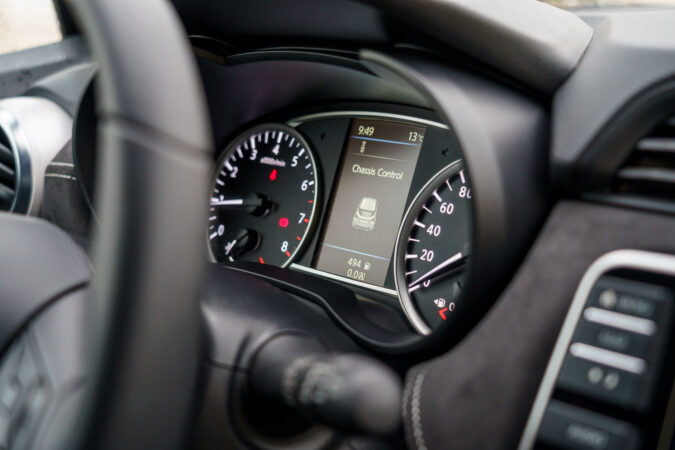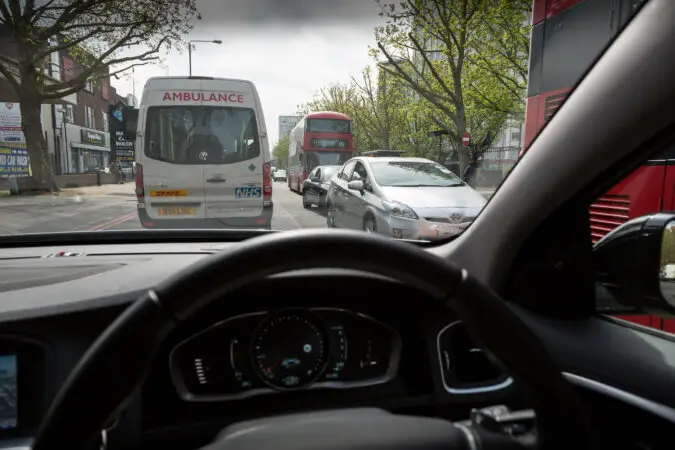It’s understandable that failing a driving test the first time can ruin your day, but the truth is that many Americans take driving tests more than once, and you can retake the test as many times as you can afford. But how many times can you fail your drivers test?
Remember that the chances you have for retakes and the time frames for rescheduling retests vary depending on the state’s laws.
Driving Test Checklist
Whether you learned to drive with the help of a friend or a professional instructor, it’s crucial that you take your test in a car you are comfortable with.
Most likely, your instructor’s vehicle will be test-ready. There are a few prerequisites that your vehicles must meet, though, if you intend to utilize them.
These consist of:
- The tax
- Having a current warranty and registration
- Not having any caution lights on the dashboard
- Having all tires with the required amount of tread
- Capable of traveling at least 62 mph
- Never smoke while you’re driving
- Possess L-plates
- Own a second internal driving test mirror
- If you have a dash cam, it cannot record audio or video inside the vehicle.
If you’ve decided to use your own vehicle for your driving test, there are a few preparations that are crucial in addition to the legal requirements:
- Make sure you have enough fuel
- Refill the water/oil
- Wash the windows and mirrors both inside and out
- Make sure the passenger seat is tidy and the footwell is vacant.
- Take out any trash and clean the interior of the vehicle.
- Wash your license plate and outside lights.
- The fear of a driving test can be mitigated by preparation
1. How To Prepare For Your Driving Test
Avoid the misery of a test cancellation due to paperwork forgetfulness. You should bring the following items with you to the testing facility:
- Your temporary license to drive
- If your provisional license is on paper, a valid passport
- Proof of passing the theory test
- Glasses or contact lenses if necessary
2. Other Factors To Think About
Your teacher or a buddy can sit silently in the backseat if you’d prefer companionship during the driving exam. They will have to abide by some regulations, but it can be comforting to be aware of them.
Consider your clothing choices. Avoid wearing anything that could impede movement or get stuck on the gear stick or handbrake and opt instead for comfortable, well-fitting clothing.
To prevent your foot from slipping off the clutch pedal and stalling, choose your shoes carefully, paying close attention to the heel and sole.
If your test examiner doesn’t speak much, don’t be concerned.
The majority of people will start a conversation to make you feel comfortable and then they might stop, but if, like many of us, talking to yourself makes you feel more at ease, you won’t be penalized for doing so.
Additionally, keep in mind that examiners are only human and can forget things just like the rest of us, thus it makes sense to write things down.
Therefore, do not be alarmed if they appear to be taking several notes.
Automatic Fails On Driving Test
If you are wondering how many times can you fail your drivers test, these are typical errors that will result in a failure on your driving test.
- Entering a different lane or traffic without checking your mirrors
- On red lights or stop signs, avoid coming to a complete stop and wait a few seconds.
- Driving while using a phone or being distracted
- Driving too quickly or slowly
- Failing to look in your mirrors
- Failing to comprehend the fundamental characteristics of your car
- Putting your surroundings and pedestrians in danger
- Not wearing a seatbelt prior to the test’s start
- Slamming on the brakes too hard
- Unparallel parking
Things To Know For Drivers Test
How Many Times Can You Fail Your Drivers Test #1. Can You Fail The Written Test Many Times
How many times can you fail your drivers test? In every state, you are permitted to fail the written driving exam an unlimited number of times, but dealing with the DMV repeatedly may be annoying, time-consuming, and expensive.
Since most people have ridden in automobiles as passengers and are aware of some traffic laws, it might be tempting to feel overconfident when taking the written driving exam.
However, studying your state’s driver’s manual is crucial for passing. Additionally, the questions are frequently taken from a database, making sure that the majority of your retests cover different subjects.
The ability to take practice exams online to better grasp their state’s laws, rules, and driving regulations is another benefit of today’s technology.
How Many Times Can You Fail Your Drivers Test #2. Can You Fail The Road Test Several Times
Every state allows you an infinite number of chances to pass the road test. So how many times can you fail your drivers test? The simple answer is that you can fail it as often as you can.
Because they feel under pressure to impress the examiner who rides along with them, some people become anxious during this portion of the examination.
Never take it personally when inspectors criticize you since they have the community’s safety in mind.
Because they usually go into great depth to discuss your errors, pay close attention to their remarks so you don’t repeat them on the second exam.
How Many Times Can You Fail Your Drivers Test #3. How Many Errors Are Permitted In Tests
Every state allows a variable number of errors on driving tests, and examiners evaluate errors based on their context.
Even a few little errors won’t cause you to fail the exam, but engaging in any risky or unlawful behavior will definitely prevent you from receiving that license.
If the examiners believe you to be a risk to both yourself and others, they may decide to end the driving test early.
If you make a few minor mistakes, try to remain calm because no one is expecting you to get an A+ and you still have a chance of passing the driving test.
How Many Times Can You Fail Your Drivers Test #4. How Many Points Are Required
Each state has its own requirements for passing a driving exam, however, the majority of them call for scores between 70% and 88%.
The states that demand the highest passing scores are Maryland, Virginia, and Idaho, while Massachusetts, New Mexico, New York, and Texas have the lowest.
How Many Times Can You Fail Your Drivers Test #5. What If You Fail Three Times
How many times can you fail your drivers test? If you fail the driving test three times, you can try again, however some states will require you to restart the entire application process and pay their expenses.
In a situation where you fail the driving exam three times, you have these options.
(A). Try Again
Most populated states offer test takers three opportunities to pass before requiring them to reapply for a learner’s permit, pay for the retest, and possibly pay additional fees.
Always check your local DMV website to find out how long you have to wait to restart the application process and whether you need to save money aside for it as these laws may differ from state to state.
(B). Increased Study And Practice
Driving test examiners will frequently provide you with particular information regarding errors that caused you to fail the driving test.
Pay close attention as they speak and make any further inquiries that can help you perform better the next time.
Get as much knowledge from your state’s driver’s manual as you can, and practice a lot of safe road driving in your neighborhood.
Driving Test Study Guide
The DMV road test, road exam, driver’s test, behind-the-wheel test, or driver’s license test, evaluates your capacity to drive a car confidently and safely as per the rules of the road in your state.
You will operate a car while a test examiner checks your skills in a number of realistic driving scenarios during the test.
1. What Should I Know Before Taking My Road Test
Before receiving a driver’s license, applicants must pass a road test in all 50 US states as well as Washington, DC.
Keep in mind that if you already possess a valid driver’s license issued by another state, you can typically obtain a license without taking a road test (because this implies that you passed the driving test in that state).
If you already possess a legitimate driver’s license issued by a specific foreign nation, some states also permit you to forego the DMV road test.
2. When Will I Be Old Enough To Take The Road Test
Each state has a different minimum age requirement for road tests.
Depending on the state, you may be able to take the road test if at least one of the following applies to you: You’re at least 16 years of age.
The state’s GDL program for new drivers has seen you through certain phases. Your state’s standards for new drivers have been satisfied by you.
You have fulfilled the prerequisites set forth by your state for drivers who have relocated there from another state.
3. Which Aspects Of My Driving Will Be Evaluated
You should be ready to have a variety of driving abilities tested, including navigating intersections, backing up (possibly around a corner), making three-point turns, making left- and right-hand turns, and changing lanes.
Some states might also give you a driving test to see how well you handle freeways. If so, be ready to enter a highway safely, overtake other cars, and then leave the highway.
You must also prove your proficiency with parallel parking in many states. To find out if this will be covered in your road test, see the manual for your state.
The test examiner will watch you as you practice these abilities to see if you are operating your vehicle safely and legally.
The examiner is also going to grade you on your use of turn signals, as well as leaving the proper space and distance between your car and other vehicles, braking and accelerating smoothly, checking the mirrors as well as blind spots, and heeding all the speed limits, traffic signs as well as signals, and markings on the pavements.
If you can demonstrate your driving skills to the examiner without making any serious mistakes, you should be good.
Make sure you are familiar with the standard speed limits for residential and commercial areas because you will likely be tested on driving through one; these limits are not always posted.
It would help if you practiced driving in and around the DMV facility where you plan to take the road test before the test. Learn the different traffic signs (like what does yield mean in driving) as well as traffic signals and the basic layout of the neighborhood.
4. How Else Will They Evaluate Me
The examiner will check your car to make sure it’s safe to drive before you start the DMV road test.
He or she will make that the tires are in good condition, the lights and signals are operational, and the windshield is clear of cracks and offers a sufficient field of vision.
If the examiner determines that the vehicle is unsafe to use, there will be a cancellation of the remainder of the test. The examiner can ask you to name and show the various controls of the car while you’re in the driver’s seat.
He or she might ask you to engage the parking brake, check your rear-view and side mirrors, turn on the emergency flashers, engage the turn signals, and engage the emergency flashers.
You don’t have to be the owner of the car as long as you are intimately familiar with its controls. These are the most typical controls that examiners around the nation want you to demonstrate.
However, it’s a good idea to utilize the same car you’ve practiced driving to guarantee your success on the driving test.
5. Will I Be Required To Drive Anywhere
State-specific driving test locations vary, however, most states offer a choice of driving areas. While you’re still in the parking lot, the examiner may ask you to perform some tasks.
Then, in order to assess some of your other driving abilities, your test examiner will give you the go-ahead to travel to a different site, such as a residential street, main road, or highway.
Keep your composure and adhere to the examiner’s directions because they will be observing and grading your behavior. You can ask the examiner for clarification if you’re unsure of what they’re asking you.
6. What Can I Anticipate From The DMV Exam Examiner
When it comes to the issue of how many times can you fail your drivers test, note that the person scoring your test does not want you to fail. He or she won’t try to deceive you or get you to do anything risky or against the law.
The only purpose of the examiner is to assess your driving and confirm that you are a safe driver. He or she will have a clipboard or something similar with a list of competencies you must successfully demonstrate.
Avoid reading what the examiner writes because it could be good or bad. Just think of him or her as a passenger and concentrate on the road.
7. How Many Mistakes Can I Make And Still Receive A Pass
Every state uses a different scoring system. No state, though, mandates you to receive an A.
Without necessarily failing the test, you could make a few minor errors during the drive and also pre-drive portions of the test.
The road test will be automatically failed if a driver engages in risky or illegal behavior, such as speeding, failing to stop at a red light or stop sign, failing to yield to pedestrians, or causing a collision.
Additionally, it will count heavily against you if the DMV examiner needs to take any action to prevent a collision, like grabbing the steering wheel.
8. If I Fail The DMV Road Test, Can I Retake It
Yes! You can retake the road test if you don’t pass the first time. Before you can retake the test, most states require you to wait a predetermined number of days or even weeks.
However, you may want to wait even longer while you improve your driving technique to ensure you can pass this time. Your examiner will make clear how long you’ll have to wait.
9. What Should I Do To Ensure That I Pass The Driving Test
Practice! The more supervised driving you do in a variety of scenarios, the more at ease you’ll feel on test day.
Ask your driving supervisor as many questions as you like, and work with them to hone your driving techniques.
To ensure that you are aware of all speed restrictions and safe driving procedures, make sure you have studied the driver’s manual for your state in its entirety.
The precise standards on which you’ll be judged during the driving exam are listed in several state guides. When you are practicing driving under supervision, emphasize these specific abilities.
10. Is Obtaining An Instruction Permit Necessary Before Taking The Road Test
A learner’s permit, also known as an instruction permit, is a requirement in almost all states. This is for any prospective drivers under the age of 18 before they may take their driving test.
Some states only need older prospective drivers to first pass a written or computerized knowledge test. There are however several states that also demand that they obtain an instruction permit.
The simplest method to be ready for the knowledge test is to use our free practice exams. Some drivers could even be able to pass both the knowledge test and the driving test on the same day.
You must obtain an instruction permit even though your state does not legally need you to do so at this time in order to be able to practice driving under the proper supervision.
You’ll probably need to take part in your state’s Graduated Driver’s License (GDL) program if you’re under the age of 18 or 21, in some areas.
Before you can take a driving test, many GDL programs by states require that you pass a written or even a computerized knowledge test, get a permit and keep the permit for a predetermined amount of time.
Before taking the driving test, most GDL programs demand that you certify that you have practiced driving for a predetermined minimum number of hours.
11. Once I Pass The DMV Road Test, Do I Ever Have To Retake It
Even if you passed your driving test the first time, there are some situations when you may need to retake it.
You might have to retake both the knowledge test and the driving test if your driver’s license has long since expired, was suspended, or was revoked.
Some states require you to retake the knowledge test or driving test after you reach a specific senior age.
If your state has doubts about your ability to drive safely due to a medical condition, they may also ask you to retake the driving test.
12. What Should I Bring On The Day Of The Test
Bring your instruction permit, the registration for your car, and evidence of insurance on the day of the test.
You might also need to bring proof that you completed a driver’s education course. You may also need to prove that you’ve completed the required minimum number of supervised driving hours. This is if you’re enrolled in your state’s GDL program.
Make sure you’re wearing your glasses or contacts on the day of the test. This is if you need to wear them while driving. If any additional paperwork is a requirement, inquire with your local DMV.
Some contemporary cars have automated driving aids like adaptive cruise control and self-parking. Additionally, several motorists have installed interior cameras in their vehicles.
The majority of states forbid using these tools when taking a driving test.
Check with the local DMV to see if you need to turn off any such features if your car has them in order to take your driving test if it does.
You must have a responsible adult, such as your parent, guardian, or driving instructor, accompany you to your driving test. This is because you will still legally need someone to accompany you.
If after your test you still don’t have a driver’s license, this person must be able to drive your car away.
You and your test examiner will be the only individuals who can be in the vehicle during the driving test. During your drive test, family members and pets must wait at the testing facility.
13. What Will The Cost Of The Road Test Be
State-by-state differences exist in license and driving test costs. Visit your local DMV branch or check the website.
14. What Steps Must I Take To Obtain My Driver’s License After Passing The Road Test
Congratulations! Enjoy this time because it marks the start of an exciting new chapter in your life! You will receive a form from your driving test examiner certifying that you passed the test.
Bring it, along with any other paperwork they require, to your neighborhood DMV office. You must complete an application for a driver’s license. Then provide all required documentation. You will then need to pay the required fees, and have your photo taken at the DMV.
You can be given a temporary license good for a month or two due to increased security standards. Prior to the expiration of your temporary license, your permanent license will be mailed to you.
FAQs On How Many Times Can You Fail Your Drivers Test
How Many Mistakes Are Allowed On Driving Test
You probably feel a little uneasy and worried, which could make you make careless errors that lead to driving errors. How bad the mistake is and how many errors you commit during a driving test are what matter. A driving test allows for a maximum of 15 small errors. If you receive more than that, you will unluckily fail.
How Many Questions Can You Get Wrong On Permit Test
You’re often given an exam with only 20 questions in many states. That means you can only get five questions wrong in order to pass. Therefore, improve your odds of understanding at least some of the test questions and you’ll improve your chances of doing well.
What Happens If You Fail Your Driving Test 3 Times
You must take about two months from the date of your most recent unsuccessful skills test before attempting again if you fail three driving tests. Then you will need to renew your learner’s permit if it expires before you are able to take additional driving tests. You will also need to retake a written test in order to renew.




